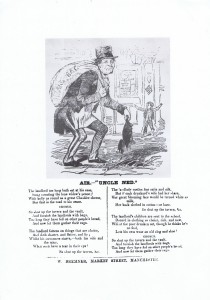| Edward II return with a brand new album, ‘Dancing Tunes’, which will get a physical release through Cadiz Music on 12 March 2021 and available as a beautifully packaged CD bolstered with fastidiously researched sleeve notes and featuring all the lyrics. ‘Dancing Tunes’ is a selection of traditional songs from Jamaica and the Caribbean as collected by Walter Jekyll and recorded by Louise Bennet, the celebrated singer, folklorist and activist for Jamaican dialect. Of course, while these songs are regarded as uniquely Jamaican, they were all written and sung in English, or the Jamaican street dialect known as Patois. Full of wit and irreverent humour, if anything these songs demonstrate that folk music is first and foremost about telling stories and entertaining each other using song and dance – a very human practice! Since the 1950’s Mento (Jamaica) and Calypso (Trinidad) have become conflated into a broad genre of Caribbean music, commercialised since the 1950’s and generally referred to as Calypso for marketing purposes. Pioneered by Lord Flea, Harry Belafonte, Lord Burgess and others, culturally and musically, it is clear that Calypso is the precursor to Reggae, Ska, Dancehall and all the subsequent sub-genres that have followed. Of course, with ‘Dancing Tunes’, the band have imparted their own unique take on the songs, re-interpreting, blending and referencing some of the English tunes which no doubt added to the original mix. Working alongside dub producer Paul ‘Lush’ Morris of Nucleus Roots, on this album Edward II have purposely recreated a British urban dub sound, using drum machines and beats intertwined with the live performances and instrumentation that has always been part of the bands unique style. Edward II are an English roots band that uniquely blend the rhythms of the Caribbean with traditional songs from the British Isles. Back in the nineties the band was signed to Cooking Vinyl Records and Rhythm Safari in the US. They worked extensively across the globe touring world music, reggae and folk festivals on almost every continent before finally calling it a day in 1999. Despite the constant touring the band always remained close friends and, in 2016, came back together to record and perform a new repertoire of songs born of the Industrial Revolution (specifically of their home town Manchester) known as the Manchester Broadsides, and released a brand new CD called ‘Manchester’s Improving Daily’. The album received a plethora of positive reviews, including Four Stars in both Mojo magazine and The Guardian. ‘Dancing Tunes’ finds Edward II still upbeat, and with rock-steady rhythms, blazing horns, fabulous harmonies and fiery melodeon melodies, the band continue to amaze audiences across the UK and Europe. For more info contact Chris Hewlett PR on chris@chrishewlett.com |
Category Archives: Uncategorized
Love Vigilante – Radio Edit
[soundcloud url=”http://ift.tt/2aqqrdG”]
Giddy Kid opens Edward II CD
Giddy Kid opens Edward II CD
The joys of un-wrapping a new Edward II ‘Manchester’s Improving Daily’ CD set to a fabulous dub remix of the title track…
Peterloo
Peterloo
This is our version of Peterloo performed live at The Big Session Festival in Buxton. Filmed by Paul Walker, the freelance cameraman who has been following the project since he first came in to film for BBC North West Tonight.
Ragbag Dub
[soundcloud url=”http://ift.tt/1T4qk7m“]
Manchesters Improving Daily MINIMAL Dub Mix 4
[soundcloud url=”http://ift.tt/1WgXqF1“]
Love Vigilante Dub Mix
[soundcloud url=”http://ift.tt/1T4qk7i“]
The Great Flood Dub Mix
[soundcloud url=”http://ift.tt/1T4qmw0“]
Love Vigilante – Dub Mix 4
[soundcloud url=”http://ift.tt/1TG1uvn”]
The Manchester Ballads
The Manchester Ballads is a collection of thirty five broadside ballads dating from the time of the industrial revolution. Collected by two local historians and folk music enthusiasts, and published with financial help from the education offices at Manchester City Council, The Manchester Ballads was produced in a handsome hardback card case, and is in the form of a folio collection of loose- leaf facsimile prints of the original penny broadsheets. There is accompanying text with many of the ballads, giving the biography of the song and, where necessary, a glossary of dialect terms. There are tunes suggested to allow the ballads to be sung communally in pubs and at home, and whilst penny broadsides were produced in the hundreds, many were written to be sung to well known tunes. The impoverished audience would, with few exceptions, have no ability to read music (Boardman and Boardman 1973) and many would also be totally illiterate, only learning the songs through the oral tradition of singing in pubs, at markets and in local homes.
The Manchester Ballads are, in essence, a snapshot of Mancunian life in the industrial era. However, they are a snapshot from a very selective source, and the themes, events, places and characters that are outlined within the lyrics of the ballads should be seen in the context not only of their chance survival, but also of the reasons for publication.
The themes in the Manchester Ballads speak of struggle (The Spinners Lamentation 1846), poverty (Tinkers Garden 1837), civic uprisings (The Meeting at Peterloo 1819) and communal tragedy (The Great Flood 1872). However, they also recall good nights out (Victoria Bridge on a Saturday Night 1861), day trips around the region (Johnny Green’s Trip fro’ Owdhum to see the Manchester Railway 1832) and the various innovations and achievements of industrial Manchester are mentioned, and praised, throughout.
